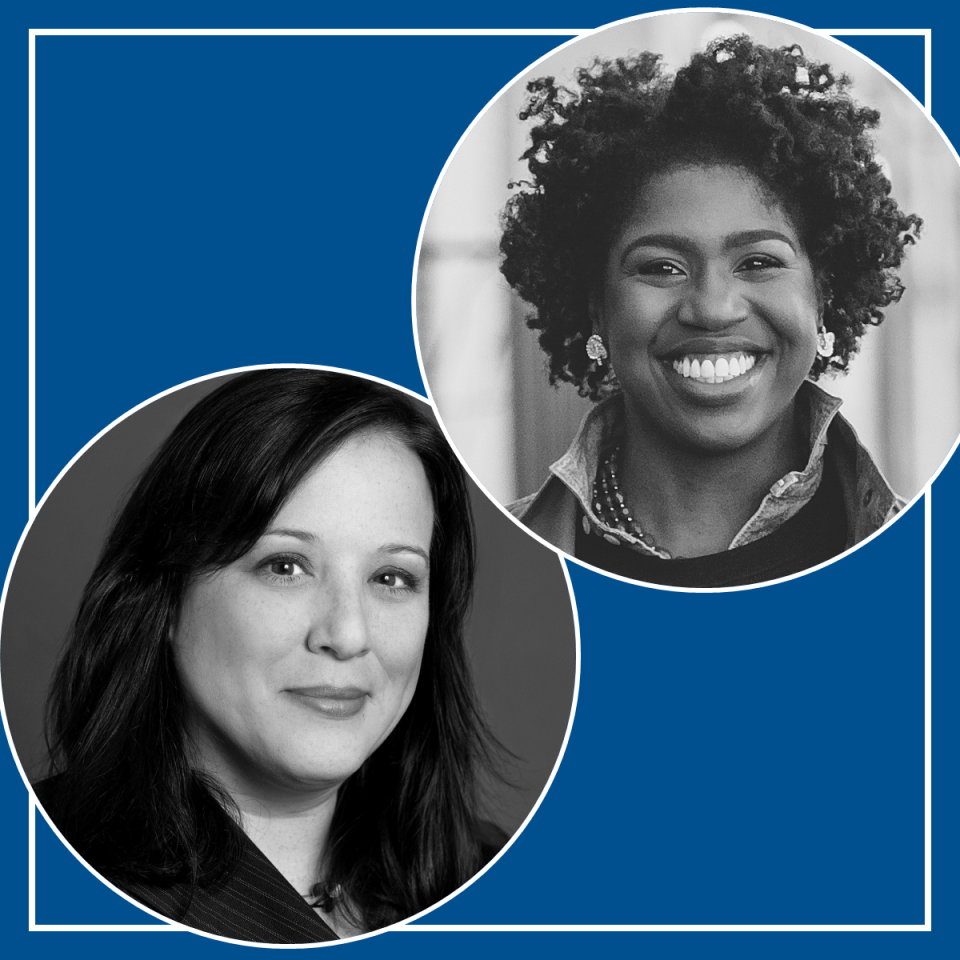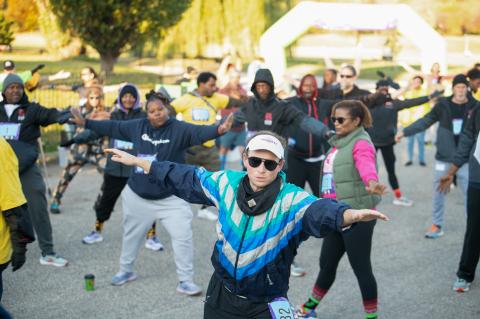
If we don’t talk about race, why are we here?
Chief Strategy Officer Keiren Havens sits down with Board leaders Chelsea N. Arthur, MS (right) and Cheryl Matricciani, CPA, Esq. to discuss representation, racial equity and their hope for the work ahead.
Keiren: Cheryl, you’re the immediate past Board chair and now Governance committee chair. Chelsea, you’re serving your first year as Board chair. Why did you choose to volunteer?
Chelsea: I didn’t plan a long-term commitment. I toured the Fallsway location, and I am a person who experienced homelessness as a child. I lived through multiple evictions, doubling up with my grandparents and aunts and uncles. The mission spoke to me.
Cheryl: I grew up in a lower socioeconomic area of Baltimore, and I often felt like “there but for the grace of God go I.” I’ve seen the city change. There are more people in need of support, experiencing homelessness, wrestling with addiction. The organization resonated with me. It feels like home.
Keiren: A survey of 1,500 U.S. non-profits by Board Source in 2017 showed that from 1994-2017, BIPOC (Black, Indigenous and People of Color) individuals have never represented more than 18% of Board composition. How do racial and gender identities of Board leaders impact a non-profits like ours? If we don’t talk about race, why are we here?
Cheryl: It makes me stop and think about why I haven’t done more and why we, as a society and an organization, haven’t done more. A majority white Board speaks volumes: We’re not listening; we’re not getting necessary participation from the community.
Chelsea: I agree that we need to do more, but I stand here today as a young, Black woman who is currently the Board chair and former Board secretary. I think that took some intention and planning by a group of white people who saw a need to diversify. And because many leaders from Black and brown communities are taught that once you get to where you are, you bring others with you and figure out how to make the culture more inclusive, the more diversity we have the more we will continue to gain. I see that happening.
Keiren: How does having broader representation impact how we accomplish our mission?
Chelsea: It brings a variety of perspectives. When staff leadership began pushing for REI, some Board members said, “We’re doing great work. You’re the shining City on the Hill! We can’t blame ourselves for any of this.” It’s hard to grapple with systematic racism without having BIPOC folks say, “Wait, you can’t look around the room and see how few of me there are and say there’s nothing wrong.”
Cheryl: With only one type of person on a Board, decisions are made in a vacuum. We need community. We need to listen. Without thought and discourse you don’t have a product that’s as meaningful.
Keiren: In the non-profit world, we have a “savior complex.” We believe we’re doing good work, and this can make it harder to address our racism. When white people are in the majority, we don’t always pay attention to our role in creating the circumstances that clients go through. What’s at stake if we do not specifically talk about race?
Chelsea: Oh yeah, this white savior complex is real! I’ve seen it play out here. We need to address clients as whole people and that means addressing the racial inequities they go through. We have to imagine being a recovering addict who is a Black man who is homeless and who’s trying to get a job. If we don’t talk about race and how we work and engage with clients, even on our Board, why are we here? “This work is about more than ‘doing good deeds,’ more than feeling good because I made a donation. There are structural problems in our community.”
Cheryl: Yes, to say that these situations affect everyone equally is ridiculous. We know that’s not the case. When I was faced with the question “What role does race play in homelessness?” I had to stop and think. This work is about more than ‘doing good deeds,’ more than feeling good because I made a donation. There are structural problems in our community.
Keiren: You both volunteered to be on the new Board REI {Racial Equity and Inclusion) subcommittee. What do you hope comes from this work?
Cheryl: REI isn’t an easy flip of the switch. Adding more POC (People of Color) to the Board and committees is a baby step. When I find myself emotional in a conversation, that’s a good opportunity to ask, “What’s making me uncomfortable or upset or angry?” The Community of Practice has been really helpful. I’m hearing all these different voices that I wouldn’t normally hear. I hope we continue to be ambitious and intentional.
Chelsea: I hope to see a thematic change in approach. I struggle with exactly how we do it. Some of it starts with increased representation and then becomes a cultural change. The Board has many points of influence, but I think it’s actually the “smaller” things that make the largest change, such as how our committees look at what they’re doing through an REI lens. We need to be comfortable with asking, “What do our flu vaccination numbers look like for Black transgender individuals?”
Keiren: Has the last year of REI work changed how you see the organization? What space have you occupied in REI discussions?
Cheryl: It was an epiphany. We simply can’t achieve the mission without addressing race and equity.
Chelsea: I have been a reluctant participant. As a Black female in America, and use my exact words—I am not here to fix your shit. You’ve got to fix it yourself. I will coach. I will give feedback and firsthand experience. I will listen to ideas. I will push back when you get lazy. I can’t fix something I didn’t make. I’m extremely thankful for colleagues like Cheryl and Shannon [McMahon]—white women in corporate America who are like, “Yeah, this is broken,” and are willing to show up and do the work. I’m thankful for other Board members I’ve seen evolve. But I showed up as a tired Black woman with very little capacity to fix something that isn’t my fault and that I am victim to every single day.
Cheryl: Chelsea, thank you for being honest. You said this early on and it made me stop and reflect. How can I learn about what other people are experiencing or how a system has harmed them if I don’t have any background? You both shared materials that have been really helpful. I benefitted from this system, absolutely. I can’t just walk away from that realization. We’re just now starting to deconstruct and rebuild.
Chelsea: And we’re laying the foundation. I think those guiding principles are how we get there: let’s do it step by step and start fixing things.
Keiren: What advice would you give nonprofit Board members who are apprehensive about REI work?
Chelsea: You are likely serving people society has left out. Nonprofits step into the gap. But those holes were created by policies designed to benefit a certain type of person. Some inequity related to race, gender or sexual orientation created the need for your nonprofit. Step away from the “feel good” in your volunteering and figure out the “why.” We cannot move forward until we understand and reconcile our shared, ugly past. Learn that history and use that fire to drive the work forward.
Cheryl: And don’t let what you think might happen stop you from participating. Just do it. If you go in thinking, “I’ve already got it figured out,” you are going to be disappointed because you don’t. That’s why we need all of us in the room.
More Recent News
At our annual staff holiday party, we take time to recognize and celebrate staff members who best represent our Core Values, as well as one recipient of the Von Bradshaw Award, named after Delvonia "Von" Bradshaw, who passed away in 2024 and truly held the principles of Health Care for the Homeless to heart. Please congratulate your colleagues when you see them!
Those of us in the Health Care for the Homeless community share a belief in something powerful: that everyone should have a place to call home.
Hope for that vision isn’t passive. It’s something that clients, staff and community supporters make possible together.
With SNAP benefits in Maryland facing uncertainty, many families are wondering how they’ll put food on the table. Here are ways Health Care for the Homeless is helping, as well as a list of local food assistance resources.
On Saturday, November 1, more than 300 runners, walkers, friends and volunteers gathered in Patterson Park for the 2025 Rock Your Socks 5K. Read all about this year's awesome event!




